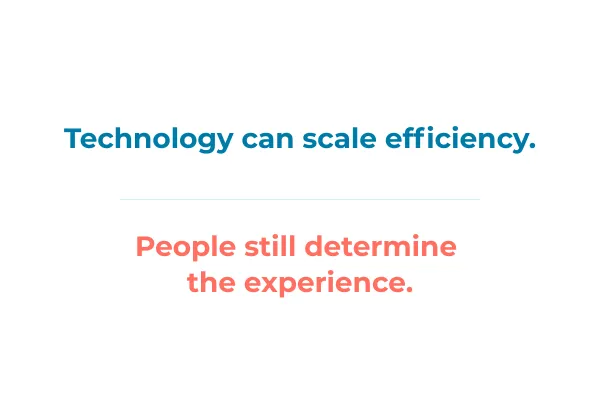
Why AI Makes Human Capability More Important Than Ever
AI is accelerating efficiency across service operations, but it is also exposing something important. The real differentiator is not the technology itself, but the capability of the people who use it.
From chatbots to co-pilots, automation is reshaping how contact centres and service teams operate. Tasks that once took minutes now take seconds. Systems can triage, respond, and suggest likely next actions before a person even sees the request.
But here is the paradox.
The more automated service becomes, the more human it needs to feel.
The Future of CX Is How Well Humans and AI Work Together
The latest Call Centre Helper 2025 Survey shows that 44.9 percent of contact centres already use AI, with another 44 percent planning to. Yet when customers face moments of emotion, urgency, or complexity, they still seek human contact.
Technology can scale efficiency.
People still determine the experience.
Automation brings accuracy.
Humans bring interpretation and reassurance.
That combination is where modern service wins.
Confidence Is the New Differentiator
Generative AI and real-time prompts give frontline teams more information than ever. The differentiator is no longer access to answers. It is confidence, the ability to use technology with judgement, empathy, and calm under pressure.
Confident agents use prompts without sounding scripted. They listen more deeply because their attention is on the client rather than on getting everything perfect. They blend efficiency with emotional intelligence, which is the part humans still deliver most convincingly.
That is what turns service from transactional to memorable. Coaching is what makes that capability real.
Leadership in the Age of AI
For team leaders this new landscape can feel demanding. Budgets are tighter, change moves faster, and coaching time keeps shrinking. Yet the report highlights something encouraging. Engagement levels in contact centres are higher than the global average. Teams thrive when they feel trusted, supported, and empowered.
Technology alone does not create that culture. Leadership does.
Leaders who build space for curiosity, learning, and real conversation are the ones who keep morale high as systems evolve. They understand that introducing AI is not only a technical shift. It is a cultural one.
The Human Edge Remains the Competitive Edge
Client priorities remain stable. First Contact Resolution is still ranked as the top driver of satisfaction, closely followed by knowledgeable advisors.
Not speed for its own sake.
Not perfect professionalism.
Clarity and competence.
AI brings precision. Humans bring context, empathy, and trust. The real opportunity is to pair intelligent systems with capable people in a way that strengthens both.
When automation takes care of the easy things, what remains are the moments that matter most.
Looking Ahead
AI will keep evolving. What will always matter is the ability to create trust, clarity, and reassurance when clients need it most.
The future of service is not purely digital. It is hybrid, with intelligent systems guided by confident, compassionate humans who know how to use them well.
This is the space my work lives in, helping frontline teams and leaders build the clarity, confidence, and communication skill that keep service human as technology transforms it.
Because the most powerful advantage in service is not more technology. It is more capability, used well by the people who carry the conversation.
